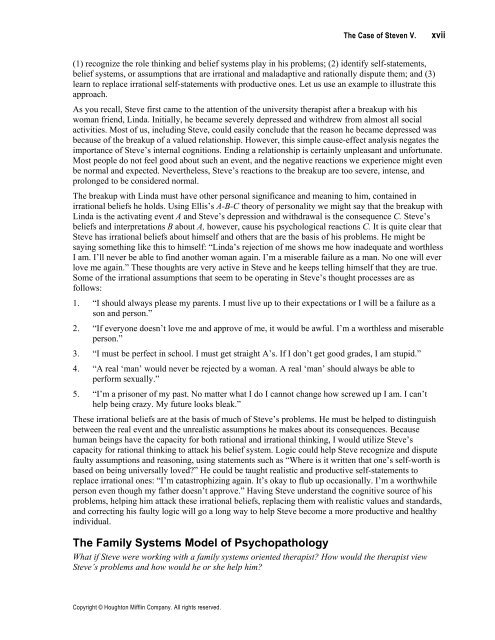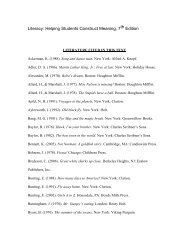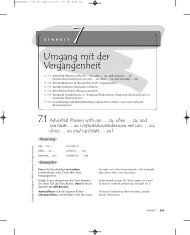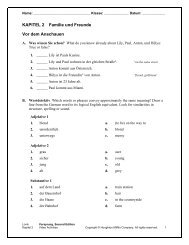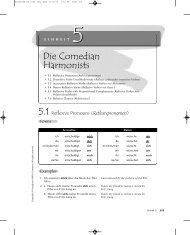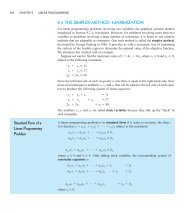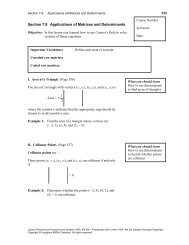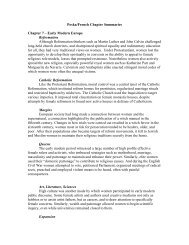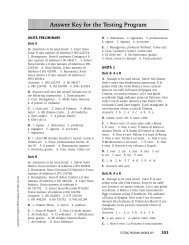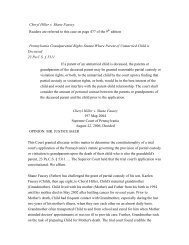Understanding Abnormal Behavior - Cengage Learning
Understanding Abnormal Behavior - Cengage Learning
Understanding Abnormal Behavior - Cengage Learning
Create successful ePaper yourself
Turn your PDF publications into a flip-book with our unique Google optimized e-Paper software.
Copyright © Houghton Mifflin Company. All rights reserved.<br />
The Case of Steven V. xvii<br />
(1) recognize the role thinking and belief systems play in his problems; (2) identify self-statements,<br />
belief systems, or assumptions that are irrational and maladaptive and rationally dispute them; and (3)<br />
learn to replace irrational self-statements with productive ones. Let us use an example to illustrate this<br />
approach.<br />
As you recall, Steve first came to the attention of the university therapist after a breakup with his<br />
woman friend, Linda. Initially, he became severely depressed and withdrew from almost all social<br />
activities. Most of us, including Steve, could easily conclude that the reason he became depressed was<br />
because of the breakup of a valued relationship. However, this simple cause-effect analysis negates the<br />
importance of Steve’s internal cognitions. Ending a relationship is certainly unpleasant and unfortunate.<br />
Most people do not feel good about such an event, and the negative reactions we experience might even<br />
be normal and expected. Nevertheless, Steve’s reactions to the breakup are too severe, intense, and<br />
prolonged to be considered normal.<br />
The breakup with Linda must have other personal significance and meaning to him, contained in<br />
irrational beliefs he holds. Using Ellis’s A-B-C theory of personality we might say that the breakup with<br />
Linda is the activating event A and Steve’s depression and withdrawal is the consequence C. Steve’s<br />
beliefs and interpretations B about A, however, cause his psychological reactions C. It is quite clear that<br />
Steve has irrational beliefs about himself and others that are the basis of his problems. He might be<br />
saying something like this to himself: “Linda’s rejection of me shows me how inadequate and worthless<br />
I am. I’ll never be able to find another woman again. I’m a miserable failure as a man. No one will ever<br />
love me again.” These thoughts are very active in Steve and he keeps telling himself that they are true.<br />
Some of the irrational assumptions that seem to be operating in Steve’s thought processes are as<br />
follows:<br />
1. “I should always please my parents. I must live up to their expectations or I will be a failure as a<br />
son and person.”<br />
2. “If everyone doesn’t love me and approve of me, it would be awful. I’m a worthless and miserable<br />
person.”<br />
3. “I must be perfect in school. I must get straight A’s. If I don’t get good grades, I am stupid.”<br />
4. “A real ‘man’ would never be rejected by a woman. A real ‘man’ should always be able to<br />
perform sexually.”<br />
5. “I’m a prisoner of my past. No matter what I do I cannot change how screwed up I am. I can’t<br />
help being crazy. My future looks bleak.”<br />
These irrational beliefs are at the basis of much of Steve’s problems. He must be helped to distinguish<br />
between the real event and the unrealistic assumptions he makes about its consequences. Because<br />
human beings have the capacity for both rational and irrational thinking, I would utilize Steve’s<br />
capacity for rational thinking to attack his belief system. Logic could help Steve recognize and dispute<br />
faulty assumptions and reasoning, using statements such as “Where is it written that one’s self-worth is<br />
based on being universally loved?” He could be taught realistic and productive self-statements to<br />
replace irrational ones: “I’m catastrophizing again. It’s okay to flub up occasionally. I’m a worthwhile<br />
person even though my father doesn’t approve.” Having Steve understand the cognitive source of his<br />
problems, helping him attack these irrational beliefs, replacing them with realistic values and standards,<br />
and correcting his faulty logic will go a long way to help Steve become a more productive and healthy<br />
individual.<br />
The Family Systems Model of Psychopathology<br />
What if Steve were working with a family systems oriented therapist? How would the therapist view<br />
Steve’s problems and how would he or she help him?


